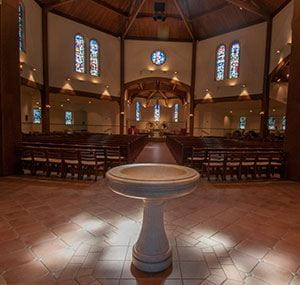by The Cowl Editor on October 29, 2020
Campus

Just How Catholic are Catholic Schools?: Taking Pride in the Strength of PC is Catholic Identity
By Joseph Kulesza ’22
Opinion Staff
If it is in the name, does it have to be true? A three-ring binder has three rings; a ferris wheel is indeed in the shape of a wheel; and a water bottle can and usually does hold water. But are Catholic schools actually Catholic?
Critics of Catholic schools have spoken out against the authenticity of these institutions, suggesting that “Catholic” schools are only Catholic in name.
An article published by The Atlantic in 2015 accused Catholic schools of not practicing what they preach, stating that “six of the top 20 nonprofit colleges that are most expensive for low-income students are Catholic institutions.” This Atlantic writer argued that Catholic schools exercise a preferential option for their endowments rather than a preferential option for the poor.
Catholic schools have been further criticized for both giving into and adopting certain curricular fads similar to those of their secular counterparts. While many of these decisions have been optional, the more well-known instances of these curricular changes have been the adoption of state-mandated common core curriculums in several Catholic high schools.
While there is plenty of criticism directed towards Catholic schools as a whole, readers of this article are likely wondering where Providence College falls into this mix.
At first glance, Providence College appears to be a Catholic school in many respects. There are crucifixes on the walls in each classroom, Gothic buildings that are a hallmark of the Church, and Dominicans walking around campus in white habits.
But, appearance does not always infer essence, and, as in all things, there can be difference between what is and what appears to be. The question now becomes whether or not this adage applies to PC. The answer to this question is best found in the people on campus, rather than the campus itself.
Inside the Ruane Center for the Humanities, Dominicans and professors alike can be seen passionately teaching one of the several staple Development of Western Civilization courses. These courses, as well as the professors who teach them, make Providence College the college it is—so much so that those three letters, D-W-C, will remain meaningful to students for the rest of their lives, and will likely give them flashbacks to reading the Aeneid.
Over the lockdown, friars rode around on golf carts playing guitars, making it on virtually every Eaton Street resident’s Snapchat story and brought them hope in an otherwise not so hopeful period.
And finally, whether students realize it or not, a large network of faculty, staff, and friars work every day for the further development of students, so that they can leave this campus with more than just a good job offer.
The members of the campus community contribute to the institution more than any other factor ever will, and in this way, the people of PC living out the Catholic mission make the College deserving of its Catholic title.
With this said, in many cases the criticisms directed at Catholic schools are fair. The higher education marketplace has become a cut-throat industry, where many colleges (not just Catholic ones) are willing to barter their integrity to increase their endowment, selectivity, or prestige.
Anthony Carnevale, a professor at Georgetown University who commented in the previously mentioned Atlantic article entitled “The Irony of Catholic Colleges,” summarized the situation well: “Christianity, let alone Catholicism, is supposed to be about taking care of each other and throwing the money changers out of the temple, but Jesus didn’t have to run a college.”
Deciding between integrity and competition is something that Catholic schools have to consider now more than ever before. The hope is that these schools side with integrity, as it can be argued that a corrupt school is worse than a bankrupt one.
Thankfully, PC’s commitment to its Catholic identity can be seen throughout and experienced on campus. As such, students can be proud to attend a college that remains true to its Catholic title.